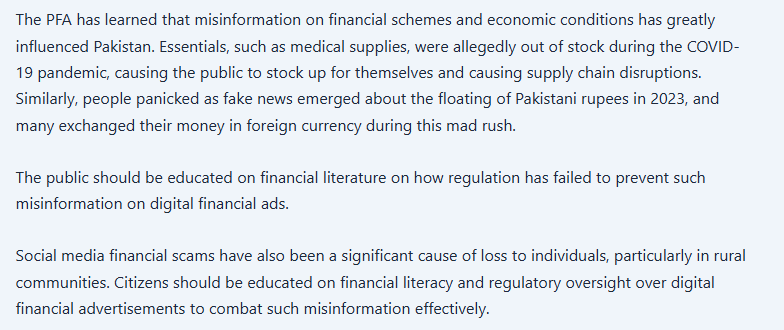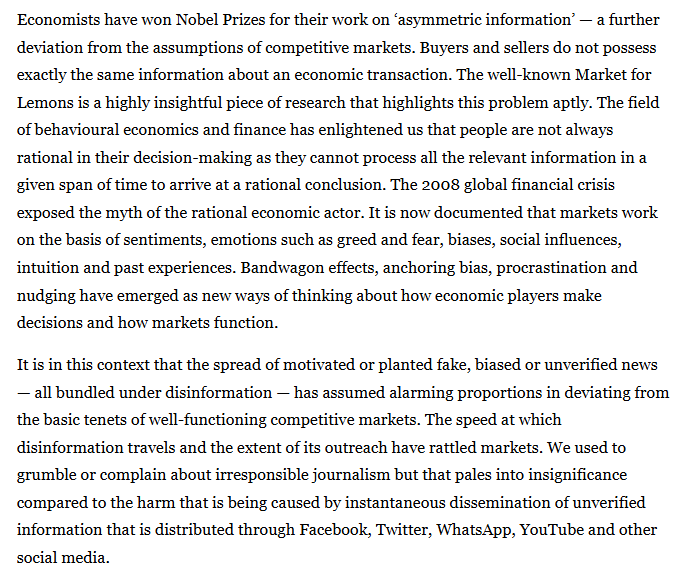In an increasingly connected world, false narratives about Pakistan’s finances, investment climate, or key national projects can rapidly spiral into panic, destabilise markets, and deter foreign investment. A growing trend of economic disinformation—woven through manipulated social media posts and online “news” platforms—is now recognised as a strategic weapon used to weaken national resilience.
Mechanisms of Economic Disinformation
- Market Manipulation
Fake alerts about bank failures, rupee collapse, or industrial bankruptcies quickly prompt mass withdrawals and currency exchanges. In 2023 and 2024, unverified claims about dramatic rupee devaluation triggered widespread panic—fueling forex shortages and informal currency dealings.

Source: Paradigm Shift
- Scare Campaigns against National Projects
False rumours circulated on X and Facebook about Beijing gaining control over major infrastructure or suspending CPEC investments. These claims aimed to shake investor faith and spark political backlash—frequently debunked, but not before causing spikes in negative sentiment.

Source: Dawn
- Fabricated Investment Offers
Entirely fictitious investment vehicles, often promising high returns, lure citizens into schemes that collapse—crippling both savings and trust in Pakistan’s informal economy.

Source: Wired
Why Pakistan Is Especially Vulnerable
- High Social Media Penetration:
Over 65% of Pakistanis rely on platforms like Facebook and WhatsApp for news—ideal for the rapid spread of engaging disinformation. - Low Financial Literacy:
A dearth of understanding around basic investment risks makes citizens more likely to act on unverified claims—often fatally. - Weak Regulatory Oversight:
Rapid growth of fake news outlets—like Channel3Now, shut down only after stirring violence abroad—illustrates how disinformation thrives without accountability.
Consequences for Pakistan’s Economy
- Currency Volatility
Sudden, panic-induced forex runs trigger rupee depreciation and compel the central bank to deploy costly reserves. - Investment Drought
Rumours of project failure prompt investors to withdraw, delay infrastructure projects, or prematurely exit markets—raising financing costs. - Fiscal Stress
Disinformation-driven credit tightening accelerates budget deficits by reducing inflows and exacerbating unemployment when economic activity slows. - Erosion of Trust
Lower public trust in institutions makes further reforms—including those vital for IMF support or trade liberalisation—hard to implement.
Recent Case Study: CPEC Misinfo
In mid-2025, several Indian-linked accounts spread falsified claims that Azad Jammu & Kashmir’s PSDP funds were being reallocated to CPEC, igniting local protests. Yet official budget and project data quickly disproved the rumours—even so, investor queries increased and media confidence suffered.
Counter-Disinformation Strategies
- Strengthening Media Literacy
Educating citizens to verify sources, especially for financial rumours disseminated on WhatsApp or Telegram. - Fact-Checking and Prompt Rebuttals
Institutions like the IMF, SBP, and planning bodies should proactively correct false claims before they go viral. Or create separate pages on their official website, actively use the official social media platforms, to discredit misinformation. - Regulating Digital Platforms
PTA must responsibly monitor viral financial hoaxes, balancing enforcement with free speech. - Legal Accountability Mechanisms
Adapt laws so promoters of economic falsehoods—especially those affecting public confidence—face penalties. - Transparency in National Projects
Regular publication of budget breakdowns, progress audits, and investment inflows boosts investor confidence.
Economic disinformation in Pakistan is not just a nuisance—it’s a strategic risk amplifier. By exploiting a fragile financial environment, malevolent actors can induce instability, scare away vital investments, and deepen public distrust.
Robust financial communication, empowered regulators, and informed citizens form the frontline defence. In today’s high-speed information ecosystem, silence is incriminating, countering economic disinformation must be as proactive and decisive as wartime messaging—to preserve both the rupee’s strength and the nation’s economic future.




























